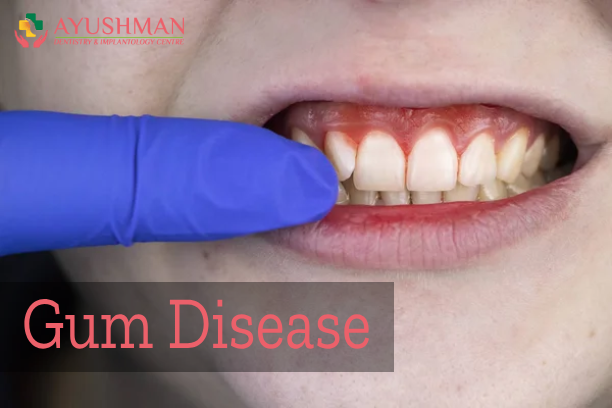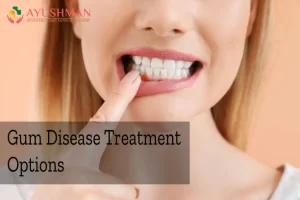What are the risk factors for Gum Disease?

What are the risk factors for Gum Disease?
Gum disease, or periodontal disease, is a major oral health issue affecting millions worldwide. Even after this, many people remain unaware of the actual risk factors present in its development. This lack of awareness can lead to serious complications, including tooth loss and major health problems. Understanding the risk factors of gum disease is needed to prevent this. Ayushman Dentistry & Implantology has the best dental care treatment.
Wondering about a gum disease treatment? At Ayushman Dentistry & Implantology Centre, we offer a comprehensive oral health check-up. Where our experts help you give the right guidance, right treatment, and unconditional care. Our experts understand your journey and only recommend the treatment best suited for you. Book your appointment with us today! or Give us a call at +91 73031 96663 you can also visit: www.ayushmandental.com/
Risk Factors
Imagine waking up one day and you find that your gums are bleeding when you brush your teeth. With time, your breath becomes noticeably bad, and your teeth start to feel loose. This isn’t just an embarrassment—it’s a sign of gum disease, which is linked to a range of other health issues, including this:
Poor oral hygiene
One of the most vital elements of gum disease is lacking of oral hygiene. When you fail to brush and floss regularly, plaque—a soft, sticky film of bacteria—builds up on your teeth and gums. If not removed, this plaque hardens into tartar, which can irritate the gum tissue and lead to inflammation.
Solution: It’s not too late to pay attention to oral care. Rub your teeth twice a day and clean between your teeth with floss. Make an appointment with your dentist for examination and regular cleanings.
Smoking & Tobacco Use
Smoking and using other tobacco products are strongly related to an increased risk of gum disease. Tobacco reduces the blood flowing to the gums, making it difficult for your body to fight off infection and heal damaged tissue.
Solutions: Try quitting smoking and talk to your dentist about any lifestyle changes.
Diseases
More factors of Gum Disease are less in our control. Usually, these types of diseases can hamper your body’s immune system and blow your gums for the worse. These include:
- Diabetes
- Cardiovascular disease
- Rheumatoid arthritis
- Crohn’s disease
- Leukemia & other cancers
- HIV/AIDS
- Other diseases and circumstances that cause decreased immunity
Solutions: Make sure to share all your medical history with your dentist so they can check & tell you if any problem occurs.
Medication
Similarly, some medications also have an impact on oral health. Some minimize the saliva flow, which can cause dry mouth and keep bacteria on your gums and tongue from washing away. Some are reasons for hormonal changes that could increase your body’s inflammatory response or alter your immune response, increasing your sensitivity to oral infections. Some things cause hormonal changes which cause inflammation in the body and lead to changes in the immune system, & increasing oral infections.
Solutions: When you’re talking to your dentist about your oral health, make sure to mention all the medications you’re currently taking. They need to know this information to understand how these drugs might affect your oral health.
Hormonal Changes
Hormonal changes, such as pregnancy, can increase inflammation and cause bacterial plaque, causing your gums to bleed. During pregnancy, women are likely to have Gum Disease if left untreated.
Solution: Never miss your dental appointment during pregnancy and tell if any problem occurs with your gum.
Age & Heredity
Unfortunately, you don’t just get genetics from your ancestors; you also get diseases too. As you get older, there are more causes for developing gum disease.
Solutions: In both situations early action is key. Ask your family if there is any history of gum disease. Talk to your doctors about these so they can check & cure your gum disease.
Do Dental Implants affect the Risk of gum Disease?
If you have dental implants or you are thinking of getting them installed, then you must have heard about peri-implant disease. While gum disease can affect dental implants, having implants doesn’t increase your risk of periodontal disease. Implants work like real teeth, so if you avoid common risk factors and maintain good oral hygiene, your implants can last a lifetime.
Conclusions:
Understanding the risk factors for gum disease is very important for maintaining good oral health and overall well-being. By practicing good oral hygiene, avoiding tobacco, being aware of genetic and medical risks, and ensuring a balanced diet, you can reduce your chances of developing gum disease. Regular dental visits are essential for monitoring your oral health and catching any issues early. Don’t wait until symptoms appear—take proactive steps to protect your gums and keep your smile healthy with Ayushman Dentistry.









